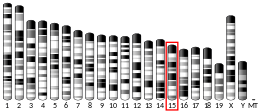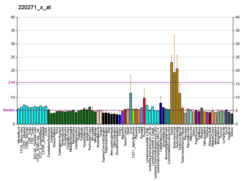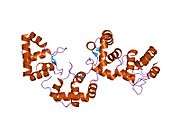EFCAB6
EF-hand calcium-binding domain-containing protein 6 is a protein that in humans is encoded by the EFCAB6 gene.[5][6][7]
| EFCAB6 | |||||||||||||||||||||||||
|---|---|---|---|---|---|---|---|---|---|---|---|---|---|---|---|---|---|---|---|---|---|---|---|---|---|
| |||||||||||||||||||||||||
| Identifiers | |||||||||||||||||||||||||
| Aliases | EFCAB6, DJBP, HSCBCIP1, dJ185D5.1, EF-hand calcium binding domain 6 | ||||||||||||||||||||||||
| External IDs | MGI: 1924877 HomoloGene: 11259 GeneCards: EFCAB6 | ||||||||||||||||||||||||
| |||||||||||||||||||||||||
| |||||||||||||||||||||||||
| |||||||||||||||||||||||||
| |||||||||||||||||||||||||
| Orthologs | |||||||||||||||||||||||||
| Species | Human | Mouse | |||||||||||||||||||||||
| Entrez | |||||||||||||||||||||||||
| Ensembl | |||||||||||||||||||||||||
| UniProt | |||||||||||||||||||||||||
| RefSeq (mRNA) | |||||||||||||||||||||||||
| RefSeq (protein) | |||||||||||||||||||||||||
| Location (UCSC) | Chr 22: 43.53 – 43.81 Mb | Chr 15: 83.87 – 84.07 Mb | |||||||||||||||||||||||
| PubMed search | [3] | [4] | |||||||||||||||||||||||
| Wikidata | |||||||||||||||||||||||||
| |||||||||||||||||||||||||
Interactions
EFCAB6 has been shown to interact with PARK7[6] and Androgen receptor.[6]
gollark: Discontinued? Seriously?
gollark: Ah.
gollark: Where can you get these mystical devices?
gollark: Video glasses sound cool.
gollark: You mean a "pi-hole"?
References
- GRCh38: Ensembl release 89: ENSG00000186976 - Ensembl, May 2017
- GRCm38: Ensembl release 89: ENSMUSG00000022441 - Ensembl, May 2017
- "Human PubMed Reference:". National Center for Biotechnology Information, U.S. National Library of Medicine.
- "Mouse PubMed Reference:". National Center for Biotechnology Information, U.S. National Library of Medicine.
- Hirosawa M, Nagase T, Murahashi Y, Kikuno R, Ohara O (Mar 2001). "Identification of novel transcribed sequences on human chromosome 22 by expressed sequence tag mapping". DNA Res. 8 (1): 1–9. doi:10.1093/dnares/8.1.1. PMID 11258795.
- Niki T, Takahashi-Niki K, Taira T, Iguchi-Ariga SM, Ariga H (Mar 2003). "DJBP: a novel DJ-1-binding protein, negatively regulates the androgen receptor by recruiting histone deacetylase complex, and DJ-1 antagonizes this inhibition by abrogation of this complex". Mol Cancer Res. 1 (4): 247–61. PMID 12612053.
- "Entrez Gene: FLJ23588 CAP-binding protein complex interacting protein 1".
Further reading
- Maruyama K, Sugano S (1994). "Oligo-capping: a simple method to replace the cap structure of eukaryotic mRNAs with oligoribonucleotides". Gene. 138 (1–2): 171–4. doi:10.1016/0378-1119(94)90802-8. PMID 8125298.
- Suzuki Y, Yoshitomo-Nakagawa K, Maruyama K, et al. (1997). "Construction and characterization of a full length-enriched and a 5'-end-enriched cDNA library". Gene. 200 (1–2): 149–56. doi:10.1016/S0378-1119(97)00411-3. PMID 9373149.
- Dunham I, Shimizu N, Roe BA, et al. (1999). "The DNA sequence of human chromosome 22". Nature. 402 (6761): 489–95. doi:10.1038/990031. PMID 10591208.
- Strausberg RL, Feingold EA, Grouse LH, et al. (2003). "Generation and initial analysis of more than 15,000 full-length human and mouse cDNA sequences". Proc. Natl. Acad. Sci. U.S.A. 99 (26): 16899–903. doi:10.1073/pnas.242603899. PMC 139241. PMID 12477932.
- Collins JE, Goward ME, Cole CG, et al. (2003). "Reevaluating human gene annotation: a second-generation analysis of chromosome 22". Genome Res. 13 (1): 27–36. doi:10.1101/gr.695703. PMC 430954. PMID 12529303.
- Ota T, Suzuki Y, Nishikawa T, et al. (2004). "Complete sequencing and characterization of 21,243 full-length human cDNAs". Nat. Genet. 36 (1): 40–5. doi:10.1038/ng1285. PMID 14702039.
- Gerhard DS, Wagner L, Feingold EA, et al. (2004). "The status, quality, and expansion of the NIH full-length cDNA project: the Mammalian Gene Collection (MGC)". Genome Res. 14 (10B): 2121–7. doi:10.1101/gr.2596504. PMC 528928. PMID 15489334.
This article is issued from Wikipedia. The text is licensed under Creative Commons - Attribution - Sharealike. Additional terms may apply for the media files.





